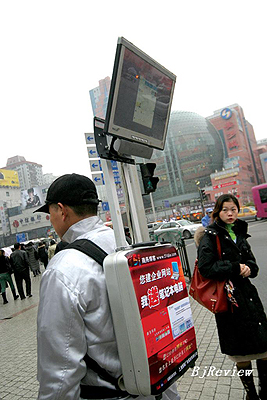
Jiang Nanchun, CEO of Focus Media, China's largest out-of-home lifestyle media company, never expected that his idea to fill people's attention lapses would not only result in the birth of a new enterprise, but also the creation of a new industry. In only four years, Focus Media has become the top Chinese media stock in the minds of U.S. investors.
Due to its phenomenal achievements and large-scale acquisitions, analysts expect Focus Media's advertising revenues to surpass 4 billion yuan this year, making it the second largest media group in China, after CCTV.
The powerful assault from emerging media technologies has stunned the traditional media.
"Regardless of whether it is in the Chinese market or the global market, new media concepts are still young," said May Zhao, General Manager of CTR Media Intelligence. "Any new media idea will promote an explosion of innovations."
At the end of 2006, the total turnover of online advertising reached 3.31 billion yuan nationwide, an increase of 840 million yuan, or 34.2 percent over the previous year. The mobile phone advertising market in 2007 is also expanding fast. Shanghai-based Internet market consulting company iResearch estimates the 2007 mobile phone advertising market to be worth 700 million yuan.
"According to our observations, the new media advertising sector in China is developing in two trends," Zhao said. "The first is new media formats created by technological innovations such as the Internet, mobile phones and digital TV; and the second is new applications of traditional media, which present themselves as innovative ideas and modes of operation. There are new advertising styles such as TV screens on buildings and public transportation and embedded advertising."
"This is the era of creative media in which brave, pioneering advertising agencies are propelling the development of new media toward a climax," she said.
The flattery of imitation
Since the launch of Focus Media in 2003, China has witnessed the emergence of a fast-growing advertising empire. The flurry of acquisitions over the past two years, including the purchase of Target Media, Framedia and Dotad Media, has allowed Focus Media to complete its extensive lifestyle media group network.
In March 2007, Focus Media paid the huge sum of $225 million to acquire China's largest online advertising and interactive marketing service provider Allyes Information Technology, which marked the start of its invasion into the online advertising market.
After the acquisition, Focus Media started to consolidate its diversified, individually targeted and mix-and-match media network that includes office building TVs, retail store TV terminals, apartment elevator posters, mobile phone advertising, out-of-home LEDs and cinema advertising. China's largest lifestyle media group has truly surfaced.
A successful business model often prompts the birth of a new industry. Focus Media has many imitators.
A large number of latecomers, including EPIN Media, Bus Online, AirMedia, Cgen Media and Tulip Media, have implemented the "Focus Media" concept in sub-channels such as trains, buses, airports and retail stores, and on large LEDs. Others like "Beauty Salon Media System" and "Bright Corner Media" have a firm grip on beauty parlors, hair salons and the washrooms of upscale offices and restaurants.
Will they become the next Focus Media? How many Focus Media-like companies can China accommodate?
A survey on the impact of different advertising media on purchasing behavior revealed the following rankings: TV, Internet, newspaper and magazine, and building-visual facilities. The above data indicate that as building visual media is becoming a more common phenomenon, it is also beginning to lose its original appeal.
Precise and targeted publicity
After weathering the bitterly cold winter of the dot-com bubble, online advertising companies have finally found a spring of promising prosperity.
According to an iResearch study, the size of the online advertising market in China in 2006 was 4.66 billion yuan. Sina.com held the biggest share, with up to 20.4 percent, followed by Sohu.com, with 13.9 percent. Together, several of the large portals managed to capture 60 percent of the market. An iResearch study also estimates that the value of the online advertising market in China will reach 6.2 billion yuan in 2007 and the 2008 online market will be affected by the Beijing Olympics and is hoped to reach 9.8 billion yuan.
Rankings in the online advertising sector are set to change this year. Analysys International analyst Liu Keyu believes that the search engine Baidu will surpass Sina.com to take the throne in China's online advertising market. This trend shows the true potential of the search engine advertising market.
"The Internet is truly magical," said Zheng Bin, CEO of HDT Advertising in describing the expandability of online advertising. "It can turn unlimited imagination into reality."
Another advantage of online advertising is that the cultural level of the audience is relatively high, as is its consumption level.
Apart from this, consumer groups influenced by online media are relevant people in relevant sectors. In other words, the Internet is targeting specific audiences. People browsing a website are usually relevant to the area to which this website belongs. Every browsing session and every click has the potential to create a moment of attention for the enterprise.
Compared with the advantages of traditional media, the low cost of new media advertising is particularly tempting. Although most people are positive about the future of online advertising, based on current developments, the potential of online advertising has not been fully exploited and most small-to-medium websites have yet to leverage their value.
More and more insiders are paying attention to the online advertising activities of small and medium-sized enterprises (SMEs). Gao Hongbing, President of Ant Interactive Media, has said that SMEs need not advertise on big names like Sina.com or Sohu.com. Instead, they should grasp the opportunity to promote their own products. This desire of SMEs happens to be ultimately the secret to the survival of small websites. If SMEs advertise their products on relevant, professional websites, the targeting effect will be much better and they will gain more enthusiastic responses.
| 